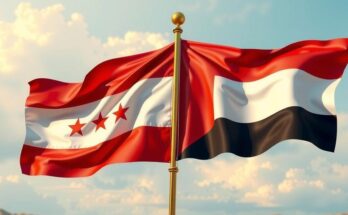A 6.8 magnitude earthquake shook eastern Cuba on Sunday, complicating the island’s recovery from recent hurricanes and ongoing power outages. The quake’s epicenter was located near Bartolome Maso, affecting various cities, including Santiago de Cuba, with reports of minor damages but no significant injuries. The situation highlights the broader challenges Cuba faces amidst systemic energy crises and the impacts of natural disasters.
On Sunday, a significant earthquake registering 6.8 in magnitude struck eastern Cuba, compounding hardships that the island has been enduring from recent hurricanes and power outages. The U.S. Geological Survey identified the epicenter of the quake as approximately 25 miles south of Bartolome Maso. Tremors resonated throughout eastern Cuba, impacting major cities including Santiago de Cuba, Holguin, and Guantanamo, with reports also indicating vibrations felt in Jamaica. Fortunately, initial assessments did not reveal any substantial injuries or major damages in Cuba. Residents across Santiago expressed their distress, with Yolanda Tabío, aged 76, noting a palpable sense of fear as people streamed into the streets. She recounted, “You had to see how everything was moving, the walls, everything.” Despite feeling at least two aftershocks, she and family members had heard of no significant damage in their area. Nonetheless, some individuals from the town of Pilon shared via social media that they experienced minor structural damage, showcasing pictures of damaged roofs and wall cracks, highlighting the vulnerabilities of Cuba’s older infrastructure. This earthquake occurs in the wake of particularly challenging times for Cuba, which recently faced the wrath of Hurricane Rafael. The powerful Category 3 storm swept through the western part of the island, resulting in widespread power outages and displacing thousands. Furthermore, just weeks prior, Cuba had been grappling with extensive blackouts stemming from an ongoing energy crisis. The cumulative effect of these incidents has heightened public discontent, igniting sporadic protests across the nation. In summary, the 6.8 magnitude earthquake adds to the existing struggles faced by the Cuban people as they navigate the aftermath of natural disasters and systemic energy issues. The resilience of the population amid these adversities is commendable, yet the necessity for infrastructural reforms and disaster preparedness remains evident as they confront these recurrent challenges.
Cuba has recently endured a series of natural and systemic crises, culminating in a challenging scenario for its residents. The island has been affected by multiple hurricanes, with Hurricane Rafael recently wreaking havoc in the western regions, followed by significant power outages affecting the entire nation. The severity of these storms, combined with an ongoing energy crisis leading to blackouts, has exacerbated an already precarious situation. The structural integrity of many buildings, due to age and lack of maintenance, further compounds the challenges faced during seismic events like the recent earthquake. Understanding these issues provides crucial context to the difficulties experienced by the Cuban populace.
The earthquake registering 6.8 magnitude presents yet another layer of difficulty for Cuba, following a succession of natural disasters that have left communities vulnerable and in distress. While immediate reports suggest no major injuries or catastrophic damages, the nation’s ongoing issues with hurricanes, blackouts, and infrastructure challenges underscore a profound need for reform and support. The spirit of the Cuban people, as they confront these challenges, highlights both their resilience and the urgent necessity for systematic improvements.
Original Source: www.wmar2news.com




